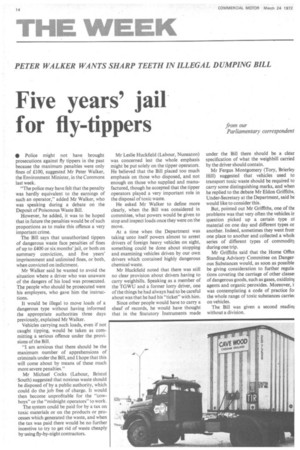Five years' jail for fly-tippers
Page 16

If you've noticed an error in this article please click here to report it so we can fix it.
• Police might not have brought prosecutions against fly tippers in the past because the maximum penalties were only fines of £100, suggested Mr Peter Walker, the Environment Minister, in the Commons last week.
"The police may have felt that the penalty was hardly equivalent to the earnings of such an operator," added Mr Walker, who was speaking during a debate on the Deposit of Poisonous Waste Bill.
However, he added, it was to be hoped that in future the penalties would be of such proportions as to make this offence a very important crime.
The Bill says that unauthorized tippers of dangerous waste face penalties of fines of up to LLICO or six months' jail, or both on summary conviction, and five years' imprisonment and unlimited fines, or both, when convicted on indictment.
Mr Walker said he wanted to avoid the situation where a driver who was unaware of the dangers of his load was prosecuted. The people who should be prosecuted were his employers, who gave him the instructions.
It would be illegal to move loads of a dangerous type without having informed the appropriate authorities three days previously, explained Mr Walker.
Vehicles carrying such loads, even if not caught tipping, would be taken as committing a serious offence under the provisions of the Bill.
"I am anxious that there should be the maximum number of apprehensions of criminals under the Bill, and I hope that this will come about by means of these much more severe penalties."
Mr Michael Cocks (Labour, Bristol South) suggested that noxious waste should be disposed of by a public authority, which could do the job free of charge. It would then become unprofitable for the "cowboys" or the "midnight operators" to work.
The system could be paid for by a tax on toxic materials or on the products or processes which generated the waste, and when the tax was paid there would be no further incentive to try to get rid of waste cheaply by using fly-by-night contractors. Mr Leslie Huckfield (Labour, Nuneaton) was concerned lest the whole emphasis might be put solely on the tipper operators. He believed that the Bill placed too much emphasis on those who disposed, and not enough on those who supplied and manufactured, though he accepted that the tipper operators played a very important role in the disposal of toxic waste.
He asked Mr Walker to define more clearly, when the Bill was considered in committee, what powers would be given to stop and inspect loads once they were on the move.
At a time when the Department was taking unto itself powers almost to arrest drivers of foreign heavy vehicles on sight, something could be done about stopping and examining vehicles driven by our own drivers which contained highly dangerous chemical waste.
Mr Huckfield noted that there was still no clear provision about drivers having to carry weighbills. Speaking as a member of the TGWU and a former lorry driver, one of the things he had always had to be careful about was that he had his "ticket" with him.
Since other people would have to carry a sheaf of records, he would have thought that in the Statutory Instruments made under the Bill there should be a clear specification of what the weighbill carried by the driver should contain.
Mr Fergus Montgomery (Tory, Brierley Hill) suggested that vehicles used to transport toxic waste should be required to carry some distinguishing marks, and when he replied to the debate Mr Eldon Griffiths, Under-Secretary at the Department, said he would like to consider this.
But, pointed out Mr Griffiths, one of the problems was that very often the vehicles ir question picked up a certain type o1 material on one day and different types or another. Indeed, sometimes they went frorr one place to another and collected a whole series of different types of commodit3 during one trip.
Mr Griffiths said that the Home Offict Standing Advisory Committee on Danger. ous Substances would, as soon as possible be giving consideration to further regula tions covering the carriage of other classe of dangerous goods, such as gases, oxidizini agents and organic peroxides. Moreover, i was contemplating a code of practice foi the whole range of toxic substances carriet on vehicles.
The Bill was given a second readini without a division.




















































































































































